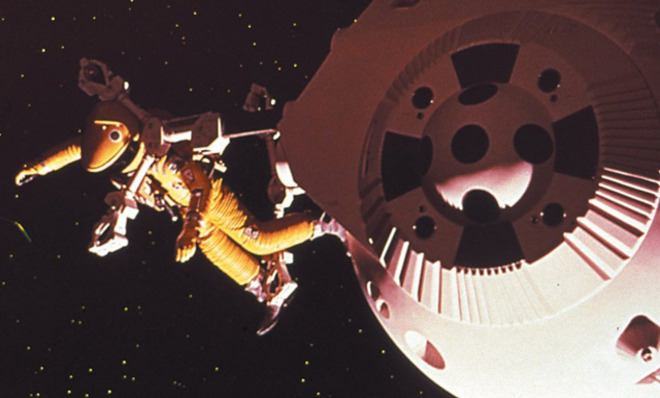A scientific fact-check of 2001: A Space Odyssey
Would a real-life HAL become a homicidal maniac?

A free daily email with the biggest news stories of the day – and the best features from TheWeek.com
You are now subscribed
Your newsletter sign-up was successful

2001: A Space Odyssey gets high marks from cinephiles and scientists alike, with good reason: director Stanley Kubrick was just as obsessive about making a scientifically plausible film as he was about crafting an epic, mythopoetic narrative.
Kubrick and his crew "paid attention to science," Peter Norvig, formerly NASA's top computer scientist, told SFGate. "They didn't cheat and have instantaneous transportation all the way across the solar system. It still took them a couple of years to get to Jupiter, and it took 10 minutes for transmissions to get back and forth."
(More from World Science Festival: Cinema Peer Review: Snowpiercer)
The Week
Escape your echo chamber. Get the facts behind the news, plus analysis from multiple perspectives.

Sign up for The Week's Free Newsletters
From our morning news briefing to a weekly Good News Newsletter, get the best of The Week delivered directly to your inbox.
From our morning news briefing to a weekly Good News Newsletter, get the best of The Week delivered directly to your inbox.
The film accurately shows space as a largely silent place (thanks to the lack of air that transmits soundwaves), and gets high marks from space experts on its depiction of zero gravity. And the design of the Jupiter-bound spaceship Discovery One was based on NASA concept studies conducted in the early 60s for EMPIRE, a class of spacecraft designed to ferry an eight-man crew to Mars.
Humanity's encounter with an alien civilization in the film, via mysterious monoliths buried on Earth, the moon, and orbiting Jupiter, is smart science fiction. Leaving hyper-intelligent machines behind and waiting to be woken up by an emerging civilization, is actually a pretty realistic strategy for advanced aliens to deal with the vast distances of space. Paul Davies, the Search for Extraterrestrial Intelligence Institute's point man for mankind's alien communication plan, pointed out in a recent interview with the World Science Festival that it takes light 100,000 years to cross the galaxy — so even if there was some sort of galactic internet, our conversations with aliens would be stretched way out.
But "if there's an alien probe in our solar system that's been sitting for millions or tens of millions of years, waiting to be woken up by some radio traffic coming from Earth, then we could have an almost real-time conversation with this probe," Davies says.
(More from World Science Festival: Cinema Peer Review: Sunshine)
A free daily email with the biggest news stories of the day – and the best features from TheWeek.com
The supercomputer HAL 9000's descent into homicidal mania is actually somewhat plausible. The film implies that HAL's decision to kill the astronauts aboard the spaceship Discovery One is motivated by self-preservation and the desire to complete his mission directive, after he observes David Bowman and Frank Poole discussing their option of disconnecting the computer. The novel delves a bit deeper into a slightly different explanation: HAL becomes distressed by the secrecy surrounding the mission to Jupiter, as it conflicts with his other directive to provide all relevant information to the crew. Killing the crew allows HAL to cut the Gordian knot of his conflicting commands; if the humans are dead, he doesn't have to lie to them.
"You can't train [artificial intelligence] for every problem it might have to solve," roboticist Daniel H. Wilson told Popular Science. "Different levels of classified information are exactly the wrench that could turn a predictable learner into a murderer."
As HAL dies, his mind degrades until he begins singing the song "Daisy Bell." In 1961, this actually was the first song "sung" by a computer, thanks to the skills of computer scientist and electronic music pioneer Max Mathews, who programmed the arrangement into an IBM 7094.
(More from World Science Festival: Cinema Peer Review: Jurassic Park)
Of course, not even Kubrick is perfect. The film makes the same mistake that Sunshine and other sci-fi films are notorious for — an astronaut takes a deep breath before entering the vacuum of space unprotected, which in reality would shred his lungs as the air expanded in the extremely low pressure, sending fatal air bubbles into his bloodstream. And there are some retro-futuristic anachronisms that make the film only slightly dated — people are using phone booths on the moon instead of cell phones, PanAm is still a company, and HAL is a giant room-sized computer.
The main thing that 2001 is really far off on is the timeline of space colonization; 13 years after that titular year, and we aren't even close to sending manned missions to Mars, let alone Jupiter. And we haven't set foot back on the moon since 1972. The fault, dear Kubrick, was not in the stars, but in ourselves.
Rating: 5 out of 5 Star Children
-
 How the FCC’s ‘equal time’ rule works
How the FCC’s ‘equal time’ rule worksIn the Spotlight The law is at the heart of the Colbert-CBS conflict
-
 What is the endgame in the DHS shutdown?
What is the endgame in the DHS shutdown?Today’s Big Question Democrats want to rein in ICE’s immigration crackdown
-
 ‘Poor time management isn’t just an inconvenience’
‘Poor time management isn’t just an inconvenience’Instant Opinion Opinion, comment and editorials of the day